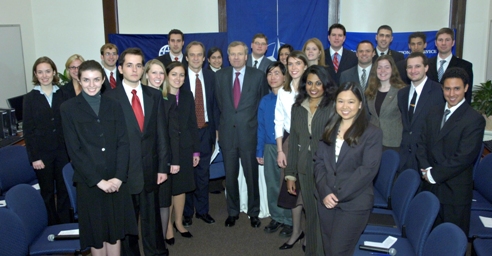
On Tuesday, March 21, 2006 the Atlantic Council organized an informal conversation between NATO Secretary General Jaap de Hoop Scheffer and 24 students from 18 colleges and universities across the United States at American University in Washington DC. Participating students came from Burma, Germany, the Netherlands, and Ukraine, as well as the United States. Texas A&M University, the University of Michigan, and the Claremont Consortium of Colleges joined in the discussion through a video conference. Students in the audience at American University were selected through an application process from the colleges and universities in the area, as well as numerous ‘study in Washington’ programs.
Moderated by David Ensor, national security correspondent for CNN, the discussion covered a range of issues. Christine DuBois at Scripps College inquired about NATO’s proper response to conflicts like Darfur, while Alexander Khapatnyukovsky of Nebraska Wesleyan University asked about the future of the Ukrainian military industry after NATO membership. Amine Tourki and Amber Forbes from the University of Michigan wanted to discuss NATO’s role in the war on terrorism, particularly the war of ideas. Several students, including Elizabeth Parker from Tufts University, sought to explore the ways in which the Alliance collaborates with other international organizations, like the European Union and the United Nations. When Anita Sundarajan of Claremont McKenna College asked about the relationship between unemployment in Europe and European security, the Secretary General also talked about areas where he believes NATO should not get involved.
In Washington as part of his regular diplomatic duties, Secretary General de Hoop Scheffer had meetings with President Bush and other senior U.S. policymakers, but he also chose to meet with what he called the “successor generation of Alliance leaders” in an effort to engage them in thinking about the challenges they will face in the future.
Following the discussion, students made the following comments:
“I appreciated the Secretary General’s candid opinion of membership in NATO — that new members had to ‘perform’ just like the current members. His remark regarding NATO and the formation of the European Defense Agency reflected the mixture of opinions in the EU: some wanting to involve NATO, which of course means somehow involving the U.S.”
– Melanie Mickelson Graham, Johns Hopkins University, SAIS
“I was pleased [to hear] the Secretary General’s enthusiasm for NATO expansion.… He routinely mentioned Georgia and Ukraine when discussing the topic, and he made it clear that he was confident that the Alliance has not seen the last round of expansion. Very encouraging.”
– Joel Myers, Old Dominion University
“He was particularly frank concerning the future of NATO. I thought that it was great that he realistically addressed the shortcomings of the organization and the fact that it had to adapt to avoid becoming irrelevant. Normally you don’t see that type of candor from such a high-profile figure.”
– Austin Kiessig, Claremont McKenna College
Image: sg_us.jpg
